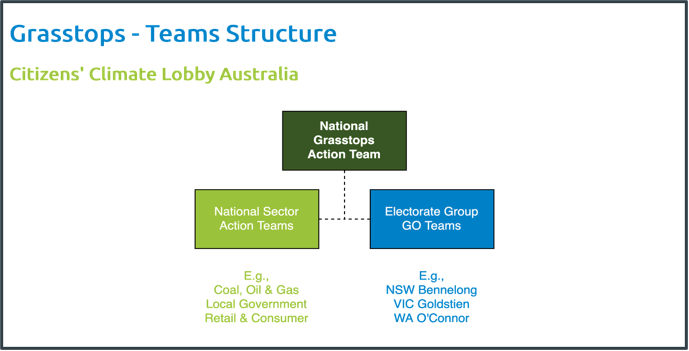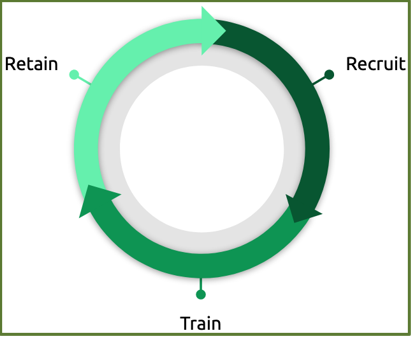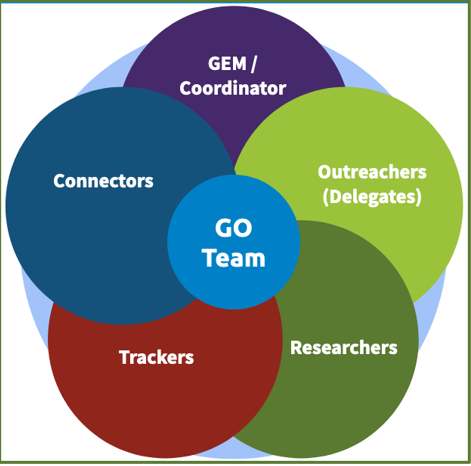Grasstops Lobbying: Step 1 Team-up
Why team-up with others?
Teams allow specialisation; different roles for people with different skills, preferences, and availability.
You may be one of those superstars who can go it alone. If so, great! Go get ‘em! However, most people benefit from working with others. In any case, if you are a superstar, others will welcome your experience and guidance.
Team members can motivate, support, and learn from each other.
More efficient → more effective → more rewarding and more fun!
A team can be as little as two people. Grow as you go.
The Grasstops Team Structure at CCL
National Grasstops Action Team
The National Grasstops Action Team oversees the Grasstops lever for CCL Australia. It operates as a virtual team across the country and is focused on building the skills of CCL volunteers and supporting National Sector Teams and local electorate groups.
National Sector Teams
These operate as virtual teams across the country. They are led by a volunteer coordinator who is knowledgeable about that sector and, ideally, made up of volunteers who have experience or contacts. They seek to educate, build partnerships with, and gain the support of national organisations and prominent individuals, across that sector.
Sector teams are effective in building broad coalitions and unlocking synergies that come when meeting with a variety of organisations.
Electorate Groups
Electorate Groups are encouraged to form and run a grasstops team. Local groups seek to educate, build partnerships with, and gain the support of local businesses, and non-governmental organisations, as well as local branches of national or international organisations.
Recruit, Train & Retain Your Team
Recruit volunteers to join your team from both inside and outside CCL.
Leverage your network, friends, family and community connections where possible.
Recruit
Here are some recruitment strategies to consider:
Hold an introductory meeting where people can connect and get to know one another better, preferably face-to-face and over food and drink.
Create a ‘Help Wanted Ad’ for your social media, or email potential team members inviting them to meetings.
If you belong to a local CCL group, workshop with your local group members.
Train
Hard Skills (Technical)
Read all the articles in the Policy Playbook on our climate solution, the Australian Climate Dividend (ACD). In addition. here are two valuable resources on communicating about carbon pricing:
The Guide to Communicating About Carbon Pricing
Handling Challenging Questions Resource
Soft Skills (Non-Technical)
A business background is not required. Being "business-like" is. These things work for grasstops lobbying, not just business:
Being organised and methodical: work in teams and follow simple, repeatable processes.
Being accountable and consistent: make, track and meet appropriate commitments, at a steady pace.
Professional, Polite and Patient Persistence (the 4 Ps).
Other soft skills include becoming an effective climate communicator, communicating across the aisle and, where applicable, applying sector specific knowledge. Use our guidebook to read up on these (available to CCL members and on request).
Retain
Support each other, reward each other and grow together.
Team Roles
Grasstops Engagement Manager (GEM):
Larger groups may choose to appoint a Grasstops Engagement Manager (GEM); otherwise the CCL Group Leader typically assumes this role with the support of Coordinators.
Coordinators:
Get things going, keeps things moving. This is most important! Without a steady cadence of brief, crisp meetings, and reminder emails and calls, volunteer efforts can tend to stall. Lead in recruiting, along with your Group Leaders. Get people organised: schedule and lead team meetings. Take the lead in motivating team members (as we all do in CCL!).
Delegates/Outreachers:
Can represent CCL in 1-on-1 or team conversation. Have some business experience, good with email and in-person communications. Have some community connections. The role is similar to the ‘liaison’ with a Member of Parliament but instead with Community Leaders.
Researchers:
Have research skills (online: LinkedIn, Twitter, websites, Google). May or may not participate in lobby meetings. Coordinate with your Group Liaison to understand the relationship with your Members of Parliament, research for Influencer Bios.
Trackers:
Comfortable with computers (Google apps, Doodle, Zoom). Good with spreadsheets (especially Google Sheets) and the CRM system.
Connectors:
Have very little time, but have community connections and/or high name recognitions. Are willing to introduce the outreachers to community leaders (e.g., email intro, join them for coffee, etc.).
Team Management
As a team, you will want to meet regularly, as without a steady cadence of brief, crisp meetings, and reminder emails and calls, volunteer efforts can tend to stall. Meet regularly and efficiently - like the perfect apple: crisp, sweet, and juicy! Follow a very simple, standard meeting process:
Record attendance
Review the previous minutes
What’s on for the next 2 weeks?
Confirm next actions and next meeting
Minutes
Resources
All the articles in this playbook on Grasstops Lobbying have been extracted from a document titled The Ultimate Guide to Grasstops Engagement. It contains a very comprehensive list of resources to help you become an effective lobbyist and is highly recommended reading. The full version is available to CCL members and on request.




